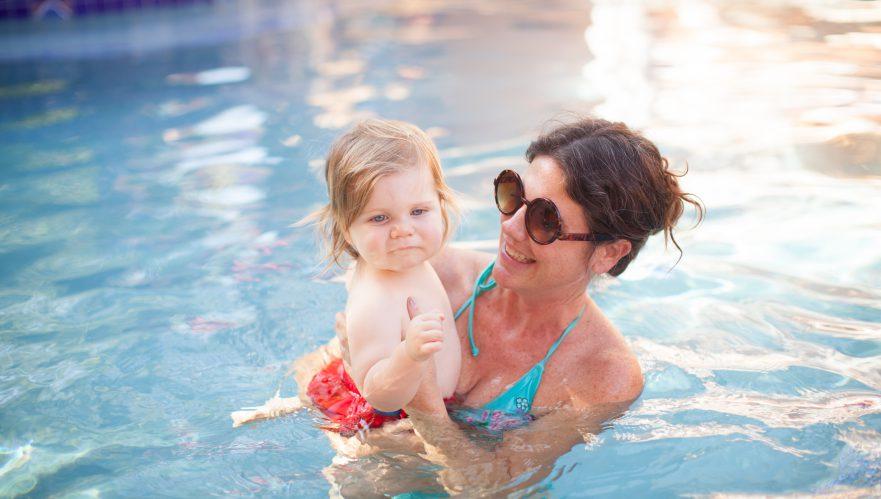How to Help Your Child Overcome a Fear of the Water
by Maggie Tancred
Crying before swim lessons? Panic at the pool? We interviewed Lisa Cook, CEO and Founder of Kidswim, to share her thoughts on helping children overcome a fear of water, along with some important water safety tips.
What are some things parents can do if their child is afraid of the water?
Children are afraid of the water for different reasons. Either they had a negative experience or they tend to be cautious about new things in general and the water seems like a massive and scary place to them.
I find that the best way to avoid this is to introduce your child to the water when (s)he is an infant. This is a benevolent experience where the child becomes acclimated to the water and has positive associations with it because they are with mom and/or dad.
With frequent exposure over long months, the child will connect that the water is a safe place and will be more relaxed about the process of learning to swim. In fact, many times, very young children learn to swim simply by spending time in parent/child classes because it is so enjoyable.
If however, we’re talking about an older child, over 2 or 3, we have to respect that this child needs more time to process an environment. He/she needs to feel somewhat in control of his/her surroundings. In that case, I highly recommend private lessons with few distractions. It takes about 2-4 lessons for a child to become comfortable with the process and routine. Once they trust their instructor, they are more willing to explore and progress.
I also strongly advise against ever dunking children, especially fearful ones.
How do you, as a parent, power through a swim class when your child is hysterically crying and resisting?
This is a great question with several answers. First of all, it’s not effective to power through anything with a hysterically crying child. They are just not receptive in any way and that experience gets stamped with a negative impact that they retain. (They have amazing memory retention for traumatic experiences.)
So first we want to address why is the child crying.
Is she hungry, tired, afraid, possibly coming down with a cold? Is there something going on in her life outside swim that’s stressful? Sometimes potty training, starting preschool, separation anxiety, an imminent new sibling or even going from a crib to a bed can cause disturbances in their world.
If the crying seems sudden and out of character from their usual happy disposition, it’s best to scale back for that lesson. Shorten the duration and work on ‘easy’ skills (i.e. things they’ve done many times and are successful at), play more games and just try to keep it positive. (Also END on a positive. This is key to continuity for next time. The goal should always be to end with a high five and a feeling of accomplishment, regardless of how much or how little they actually did).
When the crying is directly related to fear around the water or learning to swim then we just want to take some time to let them calm down and explore at their pace. Never try to force the child into the water with a stranger. Often with a fearful beginner, I even sit on the side without getting in at all. We look through the toy bag and talk about the toys. Then I get in first and they sit on the side with just their feet in (so they are in the dominant position). They always end up getting in because the curiosity of the toys overrides their fear.
I highly recommend lessons with toys for very young beginners. It makes all the difference. If used effectively, they can help simulate the hand/eye/breathing coordination needed for freestyle.
In this question I am not addressing habitual or manipulative crying which can happen too. That’s a different animal to address and is more behavior related. In this case we are strictly addressing fear or anxiety.
Some classes do not allow parents in the water and the instructors hold the children. In this case, what can you do when the child has the fear of strangers (being held by an instructor) rather than their own mom or dad? How do you help them overcome this fear?
To be honest, I never encourage children under the age of 2 being in a pool without their parent. Infants and very young toddlers are calmer, feel safer and have a much more positive experience when mom or dad is present. It’s also more helpful and productive since its crucial that mom and dad learn how to handle their child in the water given that they will be the ones doing much of the hands on activity. So I would opt to choose a class where the parents are in the water.
I do not recommend the safety classes that are strictly an infant and an instructor. Those are particularly traumatizing for babies and I’ve seen the repercussions of these classes where children cling to their parents and won’t let go. Many won’t even go in.
Children over the age of 2.5 should be able to engage and participate in a lesson with an instructor for anywhere from 15-30 minutes.
If your child is resisting, it is either the wrong instructor, the wrong environment or perhaps the wrong choice (group vs private). I find very few children resist a private lesson. Groups can be more intimidating for young children.
What can you do to help a child who is afraid of the ocean?
The ocean is a completely different animal. The ocean is highly unpredictable, quite massive in scope and its loud too! If you love the beach and you want them to love it too, simply bring them to the beach often and play with them near the water. Build sand castles, dig holes and bring lots of sand toys, especially buckets. Sometimes they become so engaged in filling up buckets of water that they end up knee deep in the ocean without realizing it. I find it’s always better to be very casual about it and eventually they’ll just become more curious than afraid.
As far as swimming in the ocean goes, I recommend that the child be at least 6 with a min of three years of consistent lessons under their belt. They should be able to swim freestyle, breaststroke and backstroke comfortably at least 50 yards.
When children get a bit older, I would recommend looking into the junior lifeguard program. These teach teach older children how to swim and be safe in the ocean.
Can you name off a few of your most important safety tips around swimming and water activities?
1. I would say the number one most important safety tip I can offer is that whichever parent is the ‘designated watcher’ of the child needs to be 100% on duty. I’ve heard many stories of near-drownings taking place because one parent thought the other one was watching. Or they thought the grandmother or nanny or friend were watching. These are innocent enough mistakes. However the cost is dramatically high.
2. If you have a pool I recommend a gate or electronic cover. Do not show your kids where the key to the gate or cover is. Keep that hidden away.
3. When your children start having drop-off playdates, it’s very important to discuss pool rules with the other parent. For example, when my son has a friend over, I ask the following questions: Does your child like to swim? Is he safe on his own or is it better if I’m in the pool? How many years has he had lessons?
4. I also reassure the parent that I will be there watching the entire time. If I am the one dropping off my son, I always ask if the kids will go swimming and I need to know what their rules are about supervision. When I don’t feel comfortable or its a new friend/situation, I may ask that the kids do not swim.
If you don’t feel 100% comfortable with a situation, definitely opt out.
5. Lastly, make sure your kids know what YOUR rules are about swimming, jumping, diving, water safety and when its time to come out. You don’t want to be standing on the side telling your kids twenty times its time to come out. Make sure they know you mean business the first time.
Lisa Cook is the CEO of Kidswim. For 16 years, she has spoken and written about water safety. Living in Southern California, she understands that water related activities are a way of life here and there are a variety of situations that present conflicts for parents with young children. As a businesswoman with 30 plus years in aquatics, as well as being a writer and a mom of two boys, Lisa understands what parents go through in their desire to protect their children. She is able to convey information in a helpful and informative way which allows parents to make educated decisions that enable them to get the best results and minimizes their anxiety.
The Mother Company aims to support parents and their children, providing thought-provoking web content and products based in social and emotional learning for children ages 3-6. Check out Golf Cart Batteries episodes of our Emmy award winning series “Ruby’s Studio,” along with our beautiful children’s books, music, and more.
Posted in: Fear, Safety
